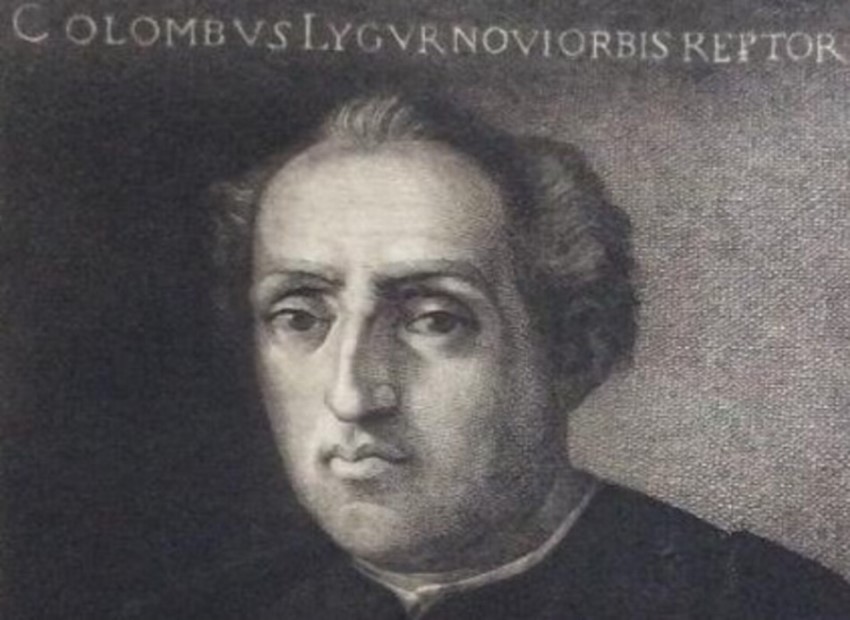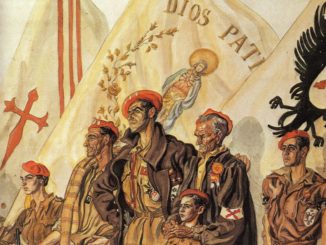
We have rescued from the Carlist newspaper archive (issue of the magazine BOINA ROJA of May 4th, 1960) an interesting article on Catholics and the art of war.
***
Recently an American journalist attended a gathering of Spanish Catholics in Madrid. Among other things, he asked how to explain the religious persecution of the years 1931-1939 in a Catholic country. As complex problems cannot be explained through simple causes, the answers were quite diverse, all of them with their small part of truth, none of them totally conclusive. Someone told him that it was partly due to the fact that Catholics had shown no interest in the modern techniques of socio-political and military struggle, and this defect had cost them such serious defeats.
We will not judge the response itself, but assuming it to be valid, we will glean insights into the attitude of Spanish Catholics with respect to civil strife.
When the apostasy of the States took place, Spanish Catholics were divided into two groups: some focused their attention on the reconquest of the State and others dedicated themselves to create, as many organizations as society needs, with a private character and Catholic identity, but outside the State, which for its part promoted analogous organizations with an anti-Catholic character. The first group, initially numerous, dwindled and the second, initially meager, increased. The first consequence was that Catholics became disinterested in the conquest of the State and in politics in general. Persecution taught them to learn from this error, but not to a sufficient degree, and it must be emphatically remedied because its dangerousness increases with the capacity of modern states to impose their will, a capacity that will grow in parallel with technology in general.
The second very grave error. Those Catholics who, instead of curing the State of its sin of apostasy, only strove to defend themselves from its consequences, created professional groups, educational and recreational centers, press, etc., all of them Catholic and marginal to the State, and it did not occur to them to create a police and an army analogous to those of the State, but at their service. They had created a state within another state, they lived happily in it and their illusion was to improve it, but they did not take care to secure it. Terrible lack of foresight.
The faithful adherence to the directive of systematically incorporating into the service of the apostolate everything that is constructed for natural purposes can help to remedy this situation. This has been done with radio and television, but it has not been done with the whole body of modern doctrine on social struggle, on the police, on war. This is not logical in a country like ours, where all Catholics admit that in certain circumstances they have the right and the duty to wage civil war. This implies the right and the duty to have a permanent peace footing.
Two organizations have contributed to salvage the situation of July 18, 1936, but they had also given rise in a certain way and through no fault of their own to this idleness on the part of many Catholics. They are the Armed Forces and Carlism. Many Catholics, whom we accuse of omission, lazily looked to them and, tacitly, delegated to them such an indeclinable duty. From a strictly Catholic point of view, the Armed Forces of the Nation cannot be counted on because their present mission is not the defense of Religion per se, but is rather one of the intangible national essences; for which reason they are only called to intervene in extreme cases and to defend a minimum of things that we should strive to overcome to a high degree. As for Carlism, there is no doubt that it remains faithful to this most glorious part of its historical mission; but the effectiveness of this largesse will be conditioned by the degree to which it assimilates, or rather, is constantly assimilating, the evolution of the doctrine of war in general and of the socio-political struggle in particular.
If we study the techniques of struggle of Catholics in these last years of persecution, we see that in the socio-political struggle of the pre-war years, 1931-1936, no technique existed to oppose to that which was deployed with overwhelming success by the professional agitators of Freemasonry and Communism. As for the war of the years 1936-1939, for different reasons, half guerrilla and half trench warfare, which a few months later the Second World War proved to be anachronistic. It was closer in method to the one that preceded it by twenty-two years than to the one that followed it five months later.
World War I, trench warfare, however, before its end, hinted at something of what the next war would be like. And WWII, war of maneuver, has also shown, and with great success, a way of fighting which will play an increasingly important role: it is psychological warfare, the socio-political sabotage of the enemy’s rearguard, the political blows of the paratroopers, the war of intelligence services to a greater extent than ever before. It is a different war, which obliges us Requetés to have a different mentality, and a different conduct, with different methods.
That is to say, renew or die. And I say this spurred on by the terrible impression I got from hearing a very good Catholic at the above-mentioned get-together, warning the Yankee journalist that if an attempt were made to impose a democratic regime on us from abroad, we would have to go back to training and take to the mountains. Ridiculous anachronism! The war which, in certain circumstances, the Requetés would have the right and the duty to wage, would not be that of trenches, nor that of movements of large units, but the war of intelligence, of daring blows, of very small units in urban centers.
And this, for several reasons. One, because it is, as we have said, the natural evolution of the art of war. Another, because it is imposed by the adoption that our enemies have already made to it. If someone fears that divulging these things is to open the eyes of the enemy, he would be guilty of serious naivety, because they have been doing this and much more, and not only saying it, for a very long time. Finally, another reason is of a technical nature: he who has less strength must seek qualitative and not quantitative combat; that is to say, he must create a new weapon different from the previous ones, which the adversary does not possess, that is to say, in which one has superiority. Since we Spanish Catholics would be the ones who would be in inferiority as long as the universal union of Catholics is not effective, and we would always have fewer material resources than our adversaries, we would therefore be forced to seek decisive means in the inexhaustible field of intelligence.




Deje el primer comentario